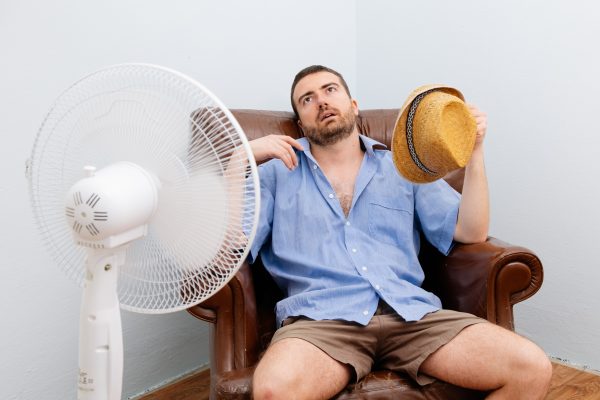Why is My House So Hot?
Do you find yourself asking, “Why is my house so hot?” every year as summer hits? Your house may be letting in heat in ways you don’t even realize. If you want energy efficient alternatives to air conditioning, you need to stop heat before it reaches the inside of your home.
- Older homes have poor insulation, allowing heat to get into your air-conditioned home.
- Your windows may have bad air sealing. This lets in hot air AND let’s a/c out.
- Humidity changes the way you perceive heat, and you may not be alleviating it.
- The south-facing side of your home gets the most sun (and heat). Do any trees provide shade? Do your windows have blinds or curtains to block the sun?

Figuring out exactly why your home is hot and using some simple solutions to cool it down will help you find some comfort and save money. Let’s dig into the details of these issues and how to solve them. Find more tips for keeping your house cool in the summer below.
TIPS ON KEEPING YOUR HOUSE COOL IN THE SUMMER
The key to keeping your house cool in the summer is stopping heat from coming inside in the first place. Use these ways to block heat from windows, walls, and roof and you’ll find yourself using your a/c less and less.
THERMAL INSULATION PROTECTS FROM HEAT
You hear about thermal insulation a lot for keeping your home warm during the winter, but it works for the summer months too. Insulating your home, protects the inside of your house against outside temperatures so it’s easier to control your inside environment.

Insulation slows the transfer of heat so your home stays cooler longer. Think about a nice cool beer on a hot day. If you put a koozie on it, it will stay cooler for much longer.
FIX AIR LEAKAGE TO COOL YOUR HOME
Insulation does little if there are holes in it. Small holes and cracks let hot air into your home just like they let cold air in. These holes can be in windows, around pipes, light fixtures, anywhere there’s a connection of materials or something entering or exiting your house.
You can fix these leaks with caulk or other air sealing measures. You can use a foam sealant to fix larger gaps. Make sure to cover fans and always use proper ventilation and face masks.
WAYS TO BLOCK HEAT FROM WINDOWS
Windows let in a huge amount of heat because they are your home’s main source of natural light. Anywhere the sun’s light goes, so goes heat. You can add many kinds of window treatments to block heat from windows, but most of them will also block light. Heavy curtains and blackout window shades reduce heat and reduce light.

Energy saving window inserts block window heat without blocking natural light. Heat blocking window inserts can bring temperatures in an attic down 16 degrees while still providing a view.
ADD A WHITE ROOF TO YOUR HOME
When temperatures rise, we tend to wear lighter colored clothes. This is because white clothes reflect heat where black clothes absorb heat. The same is true of what our houses are wearing.
Adding a white roof to your home helps reflect heat right where it’s beating down on it. You can add white paint, solar reflective asphalt shingles or clay, or concrete or fiber cement tiles. Any of these will give you energy efficient alternatives to air conditioning and extend the life of your roof.
Read more about the benefits of adding a white roof to your home.
REMOVE THE HUMIDITY
If your home has extra moisture, the heat is going to stick to you. So, why is your house so humid? Your a/c unit could actually be too big. If your home gets cooled too quickly, the a/c can’t do its other job: dehumidifying your home. It needs time to do this, and if your unit is too big for your house, it will turn off before the second job is done.
You can get a new a/c unit that fits your home better, or you can get a separate dehumidifier. Given that activities like cooking, showers, and breathing lead to humidity in your home, you can address the issue with other small changes. Reduce moisture inside by: ventilating while cooking, taking cooler, shorter showers, drying your clothes outside, move your houseplants outside for the summer.
THE “WHY IS MY HOUSE SO HOT?” CHECK LIST
Have you added?
- Thermal insulation.
- Patches for Air Leakage.
- Window Treatments.
- A White Roof.
- Plant Trees on South Side of Home.
- Alleviate House Humidity.
Once you’ve done all (or even a few) of these items, you won’t be asking yourself “Why is my house so hot?” anymore. You’ll be using energy efficient alternatives to air conditioning, and saving a lot of money on your energy bill.
